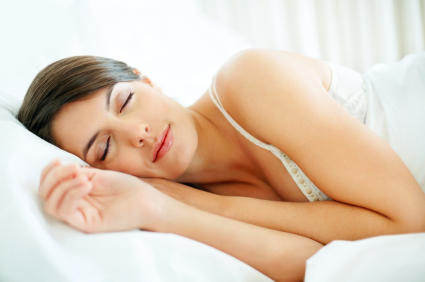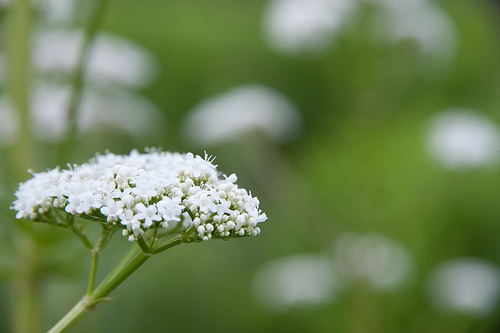Herbs for Insomnia
 Sleeplessness, or insomnia, is a condition I’m asked about over and over again. This isn’t really surprising when you think about it. Our diets, stressors and lifestyles coupled with artificial lighting, computer screens and televisions pretty much guarantee that we’re not always going to go to bed and get up at the same time every day (an important factor in conditioning our circadian rhythm for healthy sleep patterns).
Sleeplessness, or insomnia, is a condition I’m asked about over and over again. This isn’t really surprising when you think about it. Our diets, stressors and lifestyles coupled with artificial lighting, computer screens and televisions pretty much guarantee that we’re not always going to go to bed and get up at the same time every day (an important factor in conditioning our circadian rhythm for healthy sleep patterns).But the other, more confounding, aspect of insomnia is its myriad causes; sleeplessness can be due to an over-active mind, too much caffeine, not enough food, too much food, spiking cortisol levels, spiking or dropping blood sugar levels or certain drugs and/or supplements. When a client comes to me with insomnia, I usually have to ask about diet, lifestyle, supplementation and when and how the insomnia occurs in order to recommend a treatment that will work.
So, here’s a little breakdown (and I’ll try to keep it interesting…that last thing I want is for this article to be an insomnia cure). When does your insomnia occur? Do you have trouble falling asleep? Is your mind active at night? Do you just feel completely awake and unable to go to sleep? Or does your insomnia occur in the early hours (2-4 a.m. is the classic time for this type of insomnia)? Do you feel anxious and is there a churning in your belly? Does your mind suddenly wake up, despite being exhausted, keeping you from getting back to sleep?
In my experience, morning and evening varieties are the two most common forms of chronic insomnia (as opposed to occasional insomnia, which we all experience, due to excitement or nerves before a big event or an over-indulgence of food, alcohol, or caffeine). So, I’m going to break it down here into these three types: evening, morning, and occasional insomnia. Hopefully this will cover everything like a (bad pun warning) nice warm blanket.
Evening Insomnia:
Okay, so most of the time, evening insomnia is caused by an over-active mind, often caused by not giving ourselves enough time to wind down after our daily activities and/or spending our evening hours in front of a computer or television screen. Before we get to the herbs, a little practical advice: herbs help support a healthy body and body rhythms, however, they cannot do all of the work. A sleeping pill will probably knock you out no matter how much exciting television or double espressos you had throughout the day, but it’s not helping your body heal. Herbs help the body heal, but you’ve got to do your part as well. So, that said, a few suggestions: have your last meal 3 hours before you go to bed (unless you experience morning insomnia—more on that later), turn off all of your screens at least an hour before bed; take some time for silence and reflection. Read a book, have a conversation, sit on your porch and sip a cup of (herbal) tea. Worries in your mind? Jot them down. Get them out of your head and onto a page—it will do wonders for your peace of mind.
Okay. Herbs:
 Valerian (Valeriana officinalis):
Valerian (Valeriana officinalis):Valerian (pictured, right) is really good for a racing, worried mind. Try taking four capsules about an hour or so before bed (I’d avoid the tincture on this herb…valerian is wickedly stinky and unpleasant tasting). This will last you about four hours. If you wake in the night, you can take another four capsules. Valerian is a good sedative, but you won’t have any of the groggy side effects of a regular sedative. A note on valerian: your body can get used to this herb, so after three weeks, switch to one of the other recommended herbs for a couple of weeks and go back to valerian after that.
California Poppy (Eschscholzia californica):
This is a great herb for insomnia due to restlessness and anxiety (and it’s safe and gentle enough for children). This herb not only helps you to fall asleep, it improves the quality of your sleep as well. You can couple this with valerian, if you find you need a stronger sedative. A tincture is the most powerful way to take this herb (any herb, really). Try 30-40 drops twice daily (the second dose close to bedtime).
Passion Flower (Passiflora incarnata):
Passion flower is wonderful for those who tend to wake frequently throughout the night. This, too, is safe for children and those with compromised health. It can be taken in large doses (I usually keep taking it until I feel calm and tired) and for long periods of time. Try 30-60 drops of the tincture before bed. If you find that’s not enough, you can take that dose up to 4 times a day.
Hops (Humulus lupulus):
Hops is a fast-acting nervine and sedative, good for anxiety, hysteria, digestion, and stress-related illness. This herb is completely safe for most of the population (although due to the natural steroids found in hops, pregnant women and children under two years of age should avoid it). Grab a tincture or tea and follow the package directions.
Morning Insomnia:
Any of the above herbs can be taken for morning insomnia, and they’ll probably work for a while. However, the cause behind morning insomnia tends to be a spike in cortisol levels (a steroid hormone released by the adrenal glands in response to stress). An overly-high cortisol level can lead to a suppressed immune system, blood sugar irregularities, and can contribute to weight gain in the belly area. If you suspect you have high cortisol, I encourage you to have your levels checked by an MD. However, you can try the following first, and see how you do.
Also—I’ve found that people who eat low-carbohydrate diets (fewer than 14 grams of carbs per meal) tend to suffer from this type of insomnia. Try eating a small snack that combines protein, fat, and carbohydrates (such as almond butter on sprouted toast) right before bed. You can have a small snack again if you wake in the early hours. The drop in blood sugar that low-carb eaters experience can spike cortisol levels, leading to anxiety and sleeplessness.
Magnolia Bark (Magnolia officinalis):
Magnolia bark helps to relax the mind and body by lowering cortisol levels. This, in turn, can help prevent obesity and type II diabetes. Try taking this herb before bed or when you wake in the night only (more so than the other recommended herbs, since magnolia bark promotes rapid drowsiness, don’t take it during the day or before operating vehicles or heavy machinery). Start with one capsule when needed (generally 200mg of herb per capsule). Pregnant and nursing women should avoid this herb.
Ashwagandha (Withania somnifera):
Ashwagandha is a remarkable herb in that it treats stress without sapping energy. However, even though it’s not a sedative per se, it helps get you back to sleep if you are experiencing the morning cortisol/anxiety spike. Not only does this herb delay the release of cortisol, it gets to work healing the effects of stress on the body. Try taking 500mg as a daily tonic. This herb is safe for everyone.
Seriphos (Phosphatidyl Serine):
Seriphos, the brand name for the dietary supplement of Phosphoserine, is an adaptogen and adrenal supporter. I’ve found that it works wonders with an over-active cortisol level. Try taking one before bed as well as one upon waking in the night. You can increase the dose if you need to. A note from the makers of Seriphos: Seriphos should not be given to people using alkaloid stimulants or on adrenergic agonists; it is not recommended for use during pregnancy or for people with reduced kidney function or failure. If you have a sensitive stomach, take Seriphos with food.
Occasional Insomnia:
Any of the above herbs can work for occasional insomnia; however, this kind of insomnia is often due to excitement or anxiety toward a specific event (think back to being six years old on Christmas Eve…yup, that kind of sleeplessness). For these occasional bouts, I recommend meditation and journaling. Get those chasing and circling thoughts out of your head and you’ll sleep better.
You can also try the following:
Chamomile (Anthemis nobilis), Catnip (Nepeta cataria), or Kava Kava (Piper methysticum) tea:
All three of these herbs target anxiety and over-excitement. Try a cup of tea with these herbs (one or all three), steeped for 15 minutes. Add honey or stevia for sweetness, but avoid dairy (dairy can keep you awake). Add non-dairy milk (sugar free) if you prefer your tea light.
Exercise:
For over-excitement, try 20 minutes of hard-core exercise two hours or so before bed. You’ll be too tired to think (hopefully).
A Warm Bath:
A warm (not hot!) bath 90 minutes before bed, especially one laced with lavender essential oil, is wonderful for calming the mind and body. The experience of warmth, followed by the cooling down of the skin after the bath, helps the mind and body prepare for sleep.
A final note: if you take sleeping pills regularly, you may find that herbs will not work for you right away. Your body has developed a dependence on the chemical components of the sleeping pills and there will be a period of withdrawal. Try to reduce your use of sleeping pills gradually, and then have patience. You may experience a period of time where nothing works. Keep trying. Your body will heal and you will sleep.


0 comments:
Post a Comment